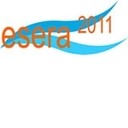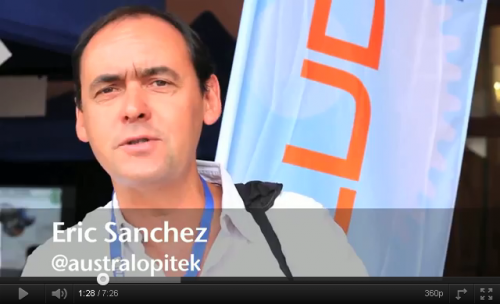06/09/2011
A game in the classroom, what do the students learn?

Sanchez, E. (2011). A game in the classroom, what do the students learn? ESERA 2011, Lyon, France.
6th September, Lyon Congress Center Strand 4, 16h30
This paper relates to an empirical study about the use of a serious game for learning how to establish the chronology of geological events. This research involved 45, 16-17 years old students. The students’ challenge consists in reproducing different images of geological cuts with Chronocoupe, a game which simulates the consequences of geological events. The research is based on the Theory of the Didactical Situations (Brousseau, 1986) and recent researches in the field of the uses of serious games for educational purposes (Egenfeldt-Nielsen, 2010). It aims at addressing the following questions: (a) Which elements should be taken into account for the game design in order to permit the learner/gamer to be engaged in epistemic activities? (b) What do the students learn when they succeed in the game?
The digital records of students’ uses of the game permits to draw a behavioral and epistemic models of students (Wenger, 1987). Data sources of the study includes as well the results of a test to assess their capacity to determine the chronology of geological events.
The study show that the design of the software must take into account that the students mostly use a trial and error strategy and that they are reluctant to shift to a strategy based on the analysis of the images to be reproduced. The study also show that the students learn procedural knowledge but they are not aware of the principles that they use when they are asked to establish the chronology of geological events.
07:33 Publié dans Jeux et apprentissage/games and learning | Lien permanent | Commentaires (0)
02/09/2011
Addressing the Complexity of the Educational Setting with Collaborative Research A Case Study about Game-Based Learning
 Addressing the Complexity of the Educational Setting with Collaborative Research
Addressing the Complexity of the Educational Setting with Collaborative Research
A Case Study about Game-Based Learning
E. Sanchez & C. Jouneau-Sion – EducTice- IFÉ - ENS Lyon
During the last few years our team has been involved in research into the use of games for secondary education. Researchers and practicing teachers collaborate to address the complexity of educational settings focused on a Game-Based Learning approach. Our research methodology is a design-based process aiming at refining both theory and practice regarding the design of games and its impact on learning outcomes. Our presentation will focus on the description of the research methodology. It will also offer the opportunity to discuss the benefits and limitations associated with this methodology.
Communication dans le cadre de la Pre-conference : Collaborative Research with Teachers in Science Education
September 5 th - 9th 2011 (10.00 -12.00 AM)
Institut français de l'Éducation (IFÉ) - ENS de Lyon
19, allée de Fontenay - 69007 Lyon
10:18 | Lien permanent | Commentaires (0)
Ludovia 2011 : les blogueurs invités ont du punch !
10:03 | Lien permanent | Commentaires (0)




